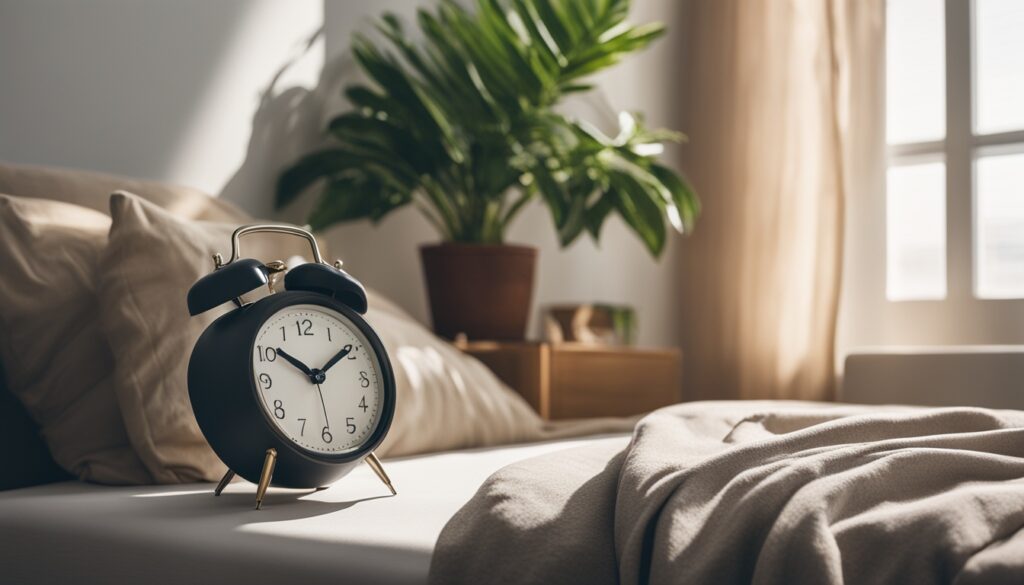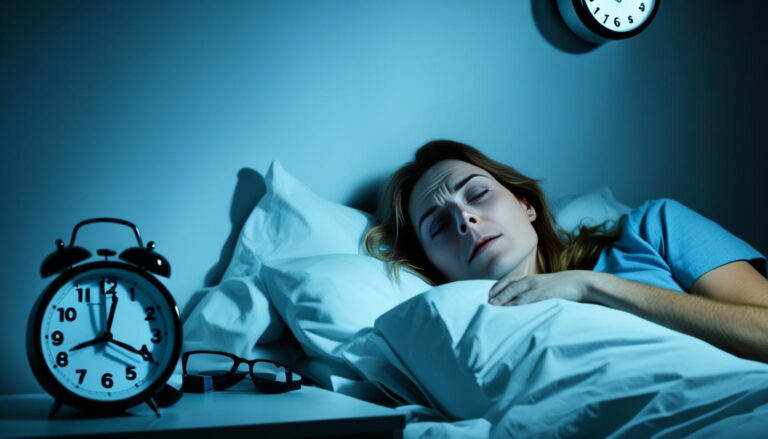Circadian Rhythm Disorders can make it hard for people to sleep and stay awake. They mess with the body’s internal clock. This can lead to problems with sleep and daily life. It’s important to know how our body’s rhythms work and how light affects our sleep and alertness.
These disorders can be short-term or last a long time. If not treated, they can lead to serious health problems. To manage them, people often change their environment. This includes using bright light in the morning and dim light at night.
There are also treatments like melatonin supplements that can help. They can fix circadian rhythm problems. For more info on sleep deprivation and how it affects the brain, check out this link.
Key Takeaways
- Circadian rhythm disorders disrupt the natural sleep-wake cycle, affecting various aspects of daily life.
- Bright and dim light therapy can significantly help manage sleep patterns.
- Melatonin supplements are frequently used to improve sleep quality related to circadian disruptions.
- Understanding each type of circadian rhythm disorder is key to effective treatment.
- Failing to address these disorders can lead to long-term cognitive and health issues.
- Lifestyle adjustments are essential in promoting better sleep hygiene.
Understanding Circadian Rhythms
Circadian rhythms are the body’s internal clocks that follow a 24-hour cycle. They control important functions like sleep and wake times. The suprachiasmatic nucleus (SCN) in the brain helps keep these rhythms in check by responding to light and dark signals.
Many things can change our circadian rhythms. Light is key, helping our body clocks stay on track. But, things like work hours, travel, and stress can mess with them. This can lead to health problems, like feeling very tired.
Disruptions to our internal clocks can lead to serious health issues. For example, obesity, diabetes, and depression are linked to them. Some people find it hard to sleep because they’re more awake at night. Others sleep too early and wake up too early.
Scientists have been studying circadian rhythms a lot, thanks to the Nobel Prize in 2017. They found important proteins like PER that help keep our daily cycles normal. This research helps us understand how to stay healthy.
Learning about circadian rhythms and their effect on sleep can help us make better choices. By sticking to a daily routine and watching what affects us, we can sleep better and feel better overall.
The Role of the Internal Body Clock
The internal body clock helps control many bodily functions. It makes sure our body works well with the day and night. This is key for staying healthy and feeling good.
This system has a master clock in the brain’s SCN. It keeps all the body’s clocks in sync. This helps our organs work together smoothly.
Things like aging, changes in the environment, or genetic changes can mess with our internal clock. This can hurt how our cells work and our health. It might affect our immune, reproductive, digestive, endocrine, and heart systems.
People who work night shifts or have irregular sleep patterns are at risk. They might not sleep well and may not even realize it.
Our circadian rhythms start early in life. Babies start to set their sleep patterns by four months. By three months, they begin making melatonin, a key hormone for sleep.
As we get older, our sleep changes. Seniors might feel tired earlier and wake up too early. This can make their sleep poor.
Teens need nine to ten hours of sleep but often don’t get it. Their internal clock shifts, making them stay up late. This can hurt their health. Understanding the internal body clock helps us keep healthy sleep habits.
| Age Group | Recommended Sleep Duration | Characteristic Changes in Circadian Rhythm |
|---|---|---|
| Newborns | Up to 18 hours | No established circadian rhythm |
| Infants | 14-15 hours | Start producing melatonin around 3 months |
| Adolescents | 9-10 hours | Delayed sleep phase shift; feel tired later |
| Adults | 7-9 hours | Stable circadian rhythm |
| Seniors | 6-8 hours | Tend to sleep earlier and wake earlier |
What Are Circadian Rhythm Disorders?
Circadian rhythm disorders happen when our body clocks don’t match up with the day-night cycle. This can make it hard to sleep and stay awake at the right times. It can also affect how well we feel and function.
Many things can cause these disorders. For example, working odd hours or having health issues can play a big part. Our brain’s master clock helps control things like our metabolism and how we think. So, keeping our body clock in sync is key.
Light and dark help set our body clocks. But other things like our daily habits, eating, exercising, and stress levels also matter. If these rhythms get out of balance, it can lead to health problems. This includes feeling tired, having trouble concentrating, and even making mistakes.
Shift work sleep disorder, jet lag, and sleep-wake phase disorders are common types. Each one makes it hard to keep a regular sleep pattern. It’s important to understand and deal with these disorders to stay healthy and happy. For more on how sleep affects our health, check out this informative article.
Types of Circadian Rhythm Disorders
Circadian rhythm sleep disorders come in many forms, each affecting sleep and health in different ways. Knowing about these disorders helps find the right ways to manage them and improve life quality.
Shift Work Sleep Disorder
Shift work sleep disorder hits those working non-standard hours hard. Many struggle to sleep well and stay awake on their shifts. It’s thought that up to a third of shift workers deal with this issue. The disorder’s severity can depend on how often shifts change and total hours worked.
Jet Lag Disorder
Jet lag disorder is big for people traveling across many time zones. Going east quickly messes up your body clock with local time. Symptoms can last longer when traveling east than west, taking about a day for each time zone crossed.
Delayed Sleep Phase Syndrome
Those with delayed sleep phase syndrome find it hard to sleep and wake up at normal times. It affects up to 4.6% of teens and young adults and 1.7% of adults. This makes it tough to keep up with daily life because of late nights and early morning problems.
Advanced Sleep Phase Syndrome
On the other side, advanced sleep phase syndrome makes people sleepy in the evening and wake up too early. About 7% of people have this, which can mess with work and social life.
Irregular Sleep-Wake Rhythm
This disorder means sleep is all over the place, with no set schedule. People feel tired and their thinking gets cloudy because their body can’t keep a regular rhythm.
Non-24-Hour Sleep-Wake Disorder
Non-24-hour sleep-wake disorder mostly affects the blind because they can’t use light to set their clocks. This leads to sleep patterns that go beyond the usual 24-hour cycle, causing ongoing sleep problems.

Causes of Circadian Rhythm Disorders
Circadian rhythm disorders come from many things that mess with our body clocks. Things like extrinsic and intrinsic factors play a big role. Environmental factors, like working shifts or traveling across time zones, are big culprits. These can really mess up our sleep patterns.
For example, shift work sleep disorder hits about one-third of people who work shifts. It causes big sleep problems. Genetics and chronic health issues can also mess with our sleep patterns. Delayed Sleep-Wake Phase Disorder mostly hits teens and young adults, affecting up to 4.6% of them.
Lifestyle choices also play a big part in circadian rhythm disorders. Not sleeping regularly and staring at screens before bed can make sleep poor quality. It’s important to stick to a regular sleep schedule. Making changes to our sleep habits has helped 70% of people sleep better.
For better sleep, starting a healthy bedtime routine is key. Setting a bedtime routine is crucial. Blind people often struggle with sleep issues because they can’t use light to keep their clocks in sync. Knowing what causes these disorders helps us find better ways to treat them.
Symptoms of Circadian Rhythm Disorders
Circadian rhythm disorders show up in many ways, affecting daily life. Knowing the symptoms of circadian rhythm disorders helps with early diagnosis and treatment. People with these disorders often find their sleep patterns don’t match the day-night cycle. This leads to big challenges.
Extreme Daytime Sleepiness
Extreme daytime sleepiness is a key symptom. It can make daily tasks hard, lower productivity, and increase safety risks. Those affected might find it tough to stay focused and feel the need to nap, which messes up their sleep cycle.
Cognitive Impairments
Cognitive impairments are another big issue. People may have trouble remembering things and making decisions. Bad sleep patterns hurt the brain’s rest and recovery, making emotions unstable and leaving you tired. This shows how important it is to fix these disorders.
Spotting these symptoms is key to finding ways to manage and treat circadian rhythm disorders. Changing sleep habits, adjusting to your environment, and understanding how dreaming affects sleep can help a lot.
Diagnosing Circadian Rhythm Disorders
Doctors need to look closely at how a person sleeps and their environment to diagnose circadian rhythm disorders. They start by asking for a detailed sleep history. This includes information about sleep patterns, how long someone sleeps, and how well they sleep.
Tools like sleep diaries help understand sleep habits better. Patient histories can also show conditions that might be affecting sleep.
A sleep study, also known as polysomnography, is a key tool for checking sleep issues. This test records things like brain activity, eye movements, and heart rate while a person sleeps. It gives important clues about circadian rhythm disorders.
Doctors might also suggest using home sleep monitoring devices. These devices track sleep patterns over time. They help get a better view of sleep cycles and any problems that might be there.
People with issues like Delayed Sleep Phase Disorder or Shift Work Disorder get a lot from these detailed checks.
Putting together patient history, sleep studies, and home monitoring is key to making a treatment plan. This approach helps manage disorders better and boosts overall health.
Treatment Options for Circadian Rhythm Disorders
Dealing with circadian rhythm disorders means making lifestyle changes and possibly using medication. There are many ways to fix sleep patterns and get back on track with your internal clock. These methods can lessen symptoms and make sleep better overall.
Adjusting Sleep-Related Behaviors
Changing how you sleep can really help with treatment. It’s key to have a regular sleep schedule. Going to bed and waking up at the same time every day helps your body clock. Also, try these tips for better sleep:
- Avoiding caffeine, especially in the late afternoon and evening, to prevent sleep disruptions.
- Limiting screen time before bed reduces blue light exposure, which can interfere with melatonin production.
- Establishing a relaxing bedtime routine can signal to the body that it is time to wind down.
- Exercising earlier in the day rather than close to bedtime supports improved sleep quality.
Use of Melatonin and Other Medications
Melatonin is often used to help with sleep-wake cycles, especially for those with delayed sleep-wake phase disorder. Taking it a few hours before bed can help adjust your sleep schedule. Though melatonin is popular, it’s not FDA approved. In some cases, stronger medications might be needed if other treatments don’t work. It’s important to work with a healthcare provider to find the right treatment for you.

Consequences of Untreated Circadian Rhythm Disorders
Untreated circadian rhythm disorders can harm both your mind and body. About 50 to 70 million Americans struggle with sleep and wake issues. These problems make everyday tasks hard and lower the quality of life.
Many people feel very tired during the day and have trouble sleeping. In fact, 18% of adults say they don’t get enough sleep. This situation has gotten worse due to our modern lifestyle.
Working odd hours, long shifts, and irregular sleep patterns play a big role. So, many people don’t get the 7 to 9 hours of sleep they need. This leads to more health problems.
These disorders are linked to mood issues like anxiety and depression. This creates a cycle where mental health gets worse.
Lack of sleep raises the risk of chronic diseases. This includes obesity, diabetes, heart disease, and high blood pressure. There are about 90 sleep disorders, making physical health worse.
Shift workers often sleep one to four hours less than others. This affects their health.
- Increased risk for obesity
- Greater likelihood of developing cardiovascular diseases
- Higher incidence of mood disorders
- Impaired cognitive function and memory
- Increased susceptibility to accidents due to decreased alertness
It’s important to tackle these disorders to avoid long-term health issues. Making changes and getting help can greatly improve health and happiness.
Prevention Strategies for Maintaining a Healthy Body Clock
Keeping a healthy body clock is key for feeling good. There are many ways to prevent problems with our sleep cycles.
Starting a regular sleep pattern is a great first step. Going to bed and waking up at the same time every day helps your body get in sync. This makes your sleep better and keeps you alert during the day.

Using light right is also important. Morning sunlight tells your body it’s time to wake up. Evening dim lights help you relax and get sleepy. But, staring at screens before bed can mess with your sleep, especially because of the blue light.
- Limit screen time before bed.
- Stay active to help make melatonin.
- Use stress-reducing activities or mindfulness.
Not eating at regular times can mess with your sleep rhythm. Eating breakfast soon after waking and avoiding big meals before bed helps. Also, when you exercise matters; it should be during the day. Working out too close to bedtime can make it hard to sleep.
Napping can be good, but be careful. A short nap is fine, but a long one after 3 p.m. can mess with your night’s sleep. Changing your sleep schedule slowly can help reset your body clock if needed.
For more help, talking to sleep experts or psychologists is a good idea. They might suggest light therapy or melatonin supplements if you’re really struggling. Using these tips can really improve your health and keep your body clock in check. Learn more about understanding your sleep type to make better choices.
Circadian Rhythm Disorders: When Your Body’s Clock is Off
Circadian rhythm disorders happen when your body clock doesn’t match the day-night cycle. This body clock disruption can make sleep poor and harm your health. It’s important to know about these disorders to improve sleep and daily life.
There are treatments for these disorders, like changing your environment. Using the right lighting can help set your sleep pattern. Bright lights wake you up, while dim lights help you relax and sleep better. Also, taking melatonin supplements or certain medications can help reset your body clock.
Good sleep habits make sleeping easier. Keep your sleep schedule regular, have a bedtime routine, and avoid screens before bed. These habits help keep your circadian rhythms healthy.
It’s key to know what affects your circadian rhythms. Things like what you eat, how much you exercise, and who you hang out with can change your body’s clock. If these rhythms get out of balance, you might face health problems like obesity, diabetes, or heart disease.
If you’re feeling very sleepy during the day, having trouble remembering things, or finding it hard to focus, you might have a circadian rhythm disorder. Getting help for these issues can make a big difference in your life.
Learn more about how sleeping right and your sleep space can improve your health.
| Symptom | Description |
|---|---|
| Extreme Daytime Sleepiness | Persistent feelings of tiredness and drowsiness during the day. |
| Cognitive Impairments | Problems with memory, focus, and mental clarity. |
| Sleep Disturbances | Difficulties falling asleep, frequent awakenings, and insufficient overall sleep. |
| Health Issues | Increased risk of obesity, diabetes, and cardiovascular problems. |
Conclusion
Circadian rhythm disorders make it hard to get good sleep, affecting our bodies and minds. About 80% of people struggle with night-time light pollution. Many workers also do night shifts, which makes daily life tough.
It’s vital to understand how these disorders work to find the right treatments. If not treated, they can lead to serious health issues like heart disease and diabetes. Using melatonin and changing sleep habits can help improve sleep quality and overall health.
Recognizing the signs of these disorders is key. Taking steps to fix sleep patterns can help. Making sleep a priority is crucial. It helps us function better every day and lowers the risk of health problems from disrupted sleep.


